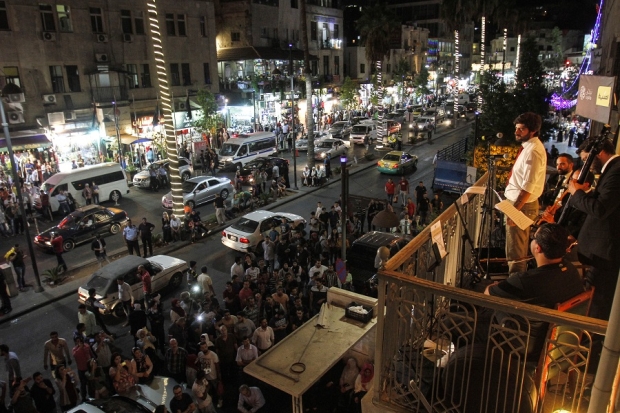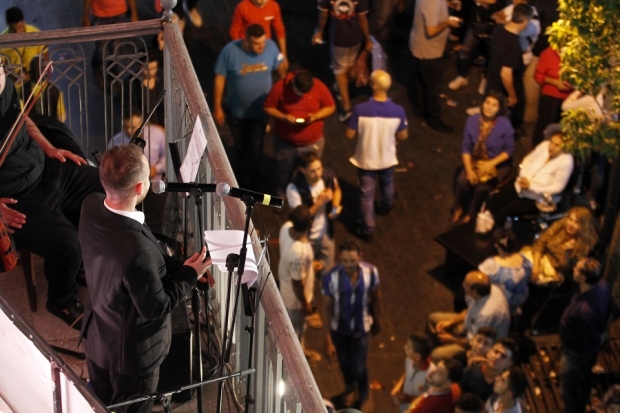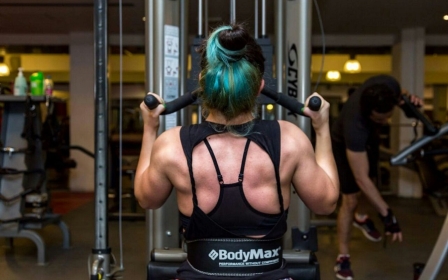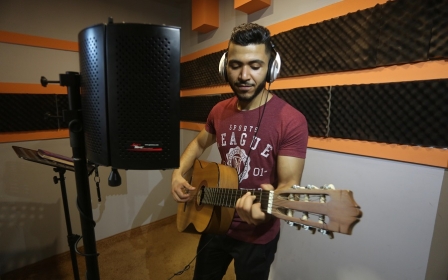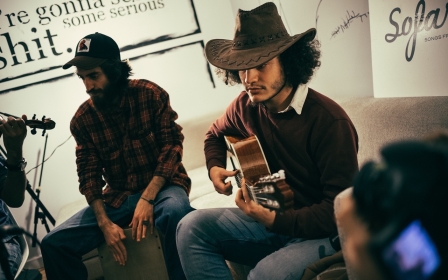Amman's balconies come alive with music
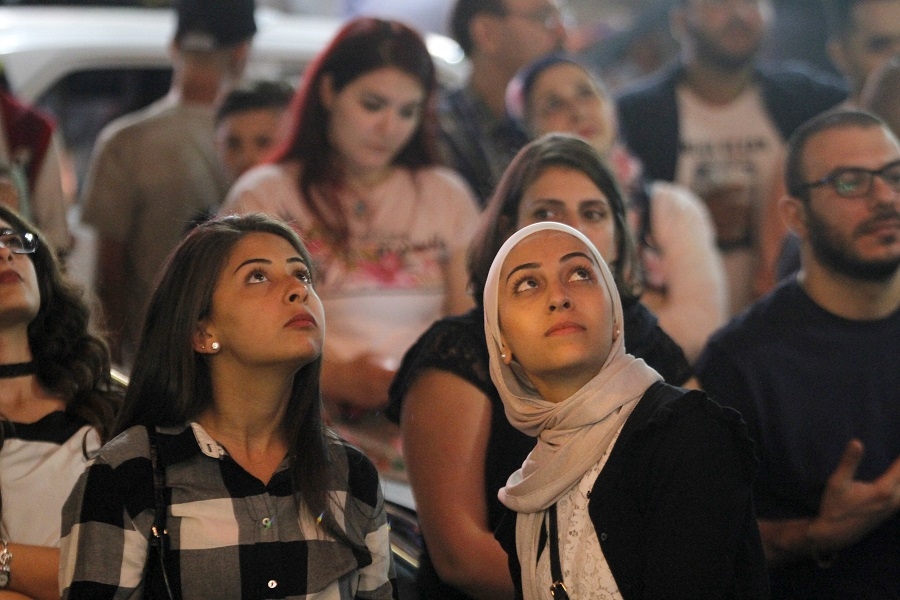
AMMAN - Known for its cacophony of beeping cars and loud street vendors, downtown Amman is not a place conducive to pleasant sounds during evening rush hour. So when a melodious tune triumphed over the usual city chaos, clothing shop owner Hisham Srouji followed it with curiosity.
Enticed by the contagious rhythm, minutes later he and other inquisitive city-dwellers arrived at Diwan al-Douk, one of Amman's oldest houses which was turned into a historical museum.
Perched on a balcony right before their eyes appeared a singing theatre ensemble performing songs and interactive sketches. The audience clapped along and danced to the beat to the unexpected concert which broke up their daily grind.
“I love the unfamiliar scene. It brings joy to all listeners after a long day,” said Srouji.
Shurufat (balconies) project
Through their interactive project called Shurufat (Balconies), spontaneity is exactly what the Tajalla association for music and art intends to cultivate for the free-of-charge performances. Because of this, the non-profit association - affiliated with the Ministry of Culture - refuses to release in advance information or dates about any of their performances.
Russol al-Nasser, the project chair, decided that the concerts should take place mainly at old houses with balconies overlooking the street. Her team partnered with Amman municipality to choose the concerts’ locations, as the municipality owns many historical buildings in downtown Amman.
For example, the historical building of Diwan al-Douk dates back to 1924 and was used as Amman's first post office until 1948; it was later turned into a hotel.
However, outside of downtown Amman, Shurufat also held a concert off of the hipster balcony at the Fan wa Chai (art and tea) coffee shop in Jabal al-Weibdeh, which is home to many expats. The owner had agreed to host the concert for free, in order to support the project.
I love the unfamiliar scene. It brings joy to all listeners after a long day
- Hisham Srouji, shop owner
Yet the project’s conception is not entirely original. “The idea was inspired by the similar and widely popular Balcony Opera project launched in Egypt in 2014 by Mahatat for Contemporary Art, a Cairo based social and cultural venture that creates opportunities for art in public spaces," Nasser told Middle East Eye.
“The project aims to create a spontaneous interaction with people on the street and bring real beauty to the city of Amman for both locals and tourists," he added.
The first show occurred in downtown Amman in 2015. “We had no idea what sort of reaction we would get - especially since the show is interactive with the community. Not to mention, people are not used to such events,” he added.
Yet Nasser believes that the project "broke the wall of fear for artists who were confined to perform in traditional theatres, especially after the direct positive responses they received from people in the street".
Connecting with the audience
The participating musicians are soloists, up and coming artists or members of local Jordanian bands. For example, one of the artists, Uday al-Nabar, is a Jordanian singer who specialises in Italian opera. The artists often perform in theatres, or cultural and artistic events in Amman.
They are paid a small fee per show through Tajalla and its sponsoring organisations, but they say that they are not driven by money. For them, the beauty of their work is their passion for spontaneous jamming and its impact on spectators.
Hind Hamed, one of the performers for Tajalla, told Middle East Eye: "As a professional singer, I’m used to pre-organised concerts with set dates and venues. But Shurufat has given me the chance to explore singing in a totally different way. The fact that we perform on different balconies in the city allows us to make a special connection with the audience and the space.”
In 2015, Hind released her album Jawa. She previously released two other albums for children.
Beyond Amman
The audience was so receptive to the initiative that organisers decided to move the event beyond the country's capital.
In April 2017, the artists carried their surprise show to the residents of Salt, which lies in the Balqa highlands. It is an ancient town that used to be a trading centre during the Ottoman empire.
At the Abu Jaber House, a heritage museum displaying the history of Salt, they performed local, regional and international music on its balcony.
Irbid, a northern city and Madaba, south of Amman, were also part of expansion.
The project aims to create a spontaneous interaction with people on the street and bring real beauty to the city of Amman for both locals and tourists
- Russol al-Nasser, chairman of Shurufat project
Additionally, they played folklore songs as well as the operas Vaga Luna and Santa Lucia, and some songs from Sayyed Darwish, known as the father of Egyptian popular music.
Hamed spoke of how nerve-wracking it can be to perform something completely new to an audience comprised of a wide range of ages, and socio-economic and religious backgrounds.
“Predicting a reaction was impossible, so we thought, let’s just do it!” she said. “Shortly after we started the concert, people on both sides of the street joined and started jamming. People began recording with their cell phones. Personally this encouraged me to sing with even more excitement."
"The development of civil society through music in order to foster a community that appreciates art, respects one another, and obeys the law, are among our goals," Khair said.
According to Nasser, there is a core team of performing artists but the band is always eager to include new artists. Performances routinely switch from eclectic styles, to folklore, to cultural heritage songs and to opera.
Bonding through music
Hussein Khuziae, a psychology professor at the University of Jordan, spoke about the positive effect that music has on people.
It gives a positive message that we have music at a time when the region is burning
- Hussein Khuziae, psychology professor
“Music provides psychological relaxation, comfort and generates positive feelings on its audiences. Bonding together over music creates a sense of security and safety,” he said.
“This is especially important for people of Jordan, from all walks of life. It gives a positive message that we have music at a time when the region is burning,” he added.
New MEE newsletter: Jerusalem Dispatch
Sign up to get the latest insights and analysis on Israel-Palestine, alongside Turkey Unpacked and other MEE newsletters
Middle East Eye delivers independent and unrivalled coverage and analysis of the Middle East, North Africa and beyond. To learn more about republishing this content and the associated fees, please fill out this form. More about MEE can be found here.


